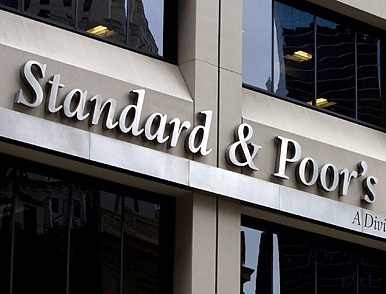
The downgrade is as much about the dysfunctional US political system as it is about the numbers. “American policymaking has weakened more than we envisioned,” is the key phrase in a statement released by Standard & Poor’s. The US fiscal debate fell short in achieving the numbers, but the lack of capacity and/or will to move constructively in the debate appears to be more damaging. (The rating reduction took place Friday, well after Wall Street closed. and the AA+ is the second highest rating, and still well above the "investment grade" standard of BBB).
The US Government (US Treasury) and a few analysts found fault or objected to the S&P move. Some called it opportunistic and/or motivated by other considerations.
Disagreement over US Growth – by $2 Trillion:
The US Treasury claims that the S&P analysis is inaccurate because the US debt to GDP ratio is not consistently calculated. The GDP is assumed to be too low. The US Treasury claims a $2 trillion error. It emphasizes the point that a downgrade is as likely to be triggered by reduced growth forecast as by too much debt. Further, the irresponsibility of the political players and “Russian roulette” they are willing to play with US creditworthiness defines more of the longer term problems and thus causes for the downgrade. (READ – “Risk of US Debt Downgrade” -
diplomaticallyincorrect.org/films/blog_post/risk-of-us-debt-downgrade-by-rating-agencies-by-ambassador-mo/32881
Some analysts – Nouriel Roubini and Barry Ritholtz speaking on Bloomberg News – saw the S&P downgrade as premature, perhaps irresponsible. Mr. Ritholtz charged even that S&P was currying favor with European and Asian policy makers as to prove its lack of favorable bias toward the US Government and markets. (French authorities and others had been pressing since the 2008 crash for the establishment of “international” rating agencies because S&P, Moody’s and Fitch have a US bias).
IS US Lower Credit than Microsoft or France?
The US is now rated AA+, below Exxon, Microsoft, Canada and France. Although I worked for S&P as legal counsel and department head during my finance career, I believed this downgrade was less likely than not. The downgrade cuts through more traditional rating methodology – US based corporations as Exxon and Microsoft being rated less than the host state.
Does Rating Affect Capital Requirements & Financial Market Considerations?
We will write more about the consequences in future posts. However, it is evident that the consequences are more political and gradual. The US Federal Reserve has confirmed what was already effective – US Treasuries and US Government guarantees (“Full faith and credit”) are considered as money and not subject to rating considerations, AAA or AA+, in terms of capital and investment holding criteria. (Such guidelines are established not necessarily by one national institutions, but a variety of Federal and state regulatory agencies and US debt is allocated capital status regardless of rating). International institutions may take a different position in theory, but the functional result should be largely similar to that of the US Fed. (Ironically, this was my first task - to evaluate impact of ratings on capital and legal investment law standards – when I started work for S&P).
US Growth & Obama Reelection in Balance?
The political consequences though may be significantly more dramatic and dynamic. Rather than heed S&P’s alarm regarding the dysfunctional political debate, each side of the political divide will look to exploit the downgrade. That could risk too much austerity and not enough growth – Roubini sees this as primary risk to US and global economy. If President Obama is not prepared to frame the debate assertively, it will be painted for him. He will be pinned into a corner in terms of efforts to stimulate the job creation and US growth at a critical time, and he risks being blamed for a US economic slowdown as well as the downgrade, with his reelection very much in balance.
Related Reports at “International Financial Crisis Channel” -
diplomaticallyincorrect.org/c/international-financial-crisis
By Ambassador Muhamed Sacirbey
Facebook – Become a Fan at “Diplomatically Incorrect”
Twitter – Follow us at DiplomaticallyX

